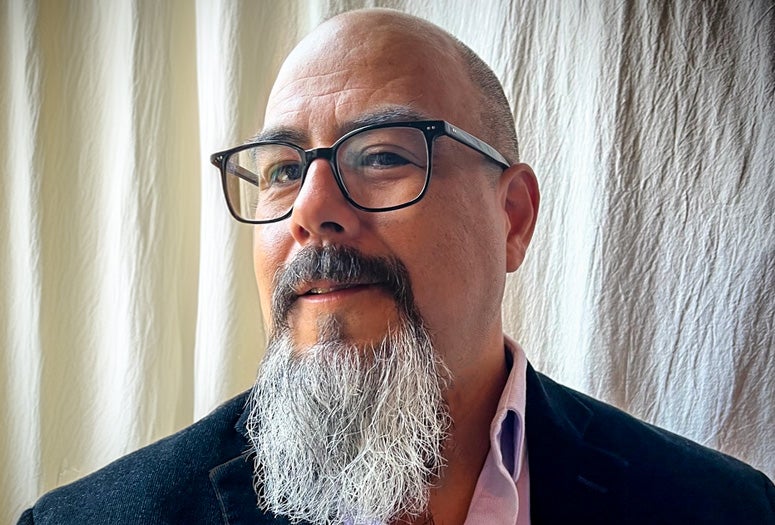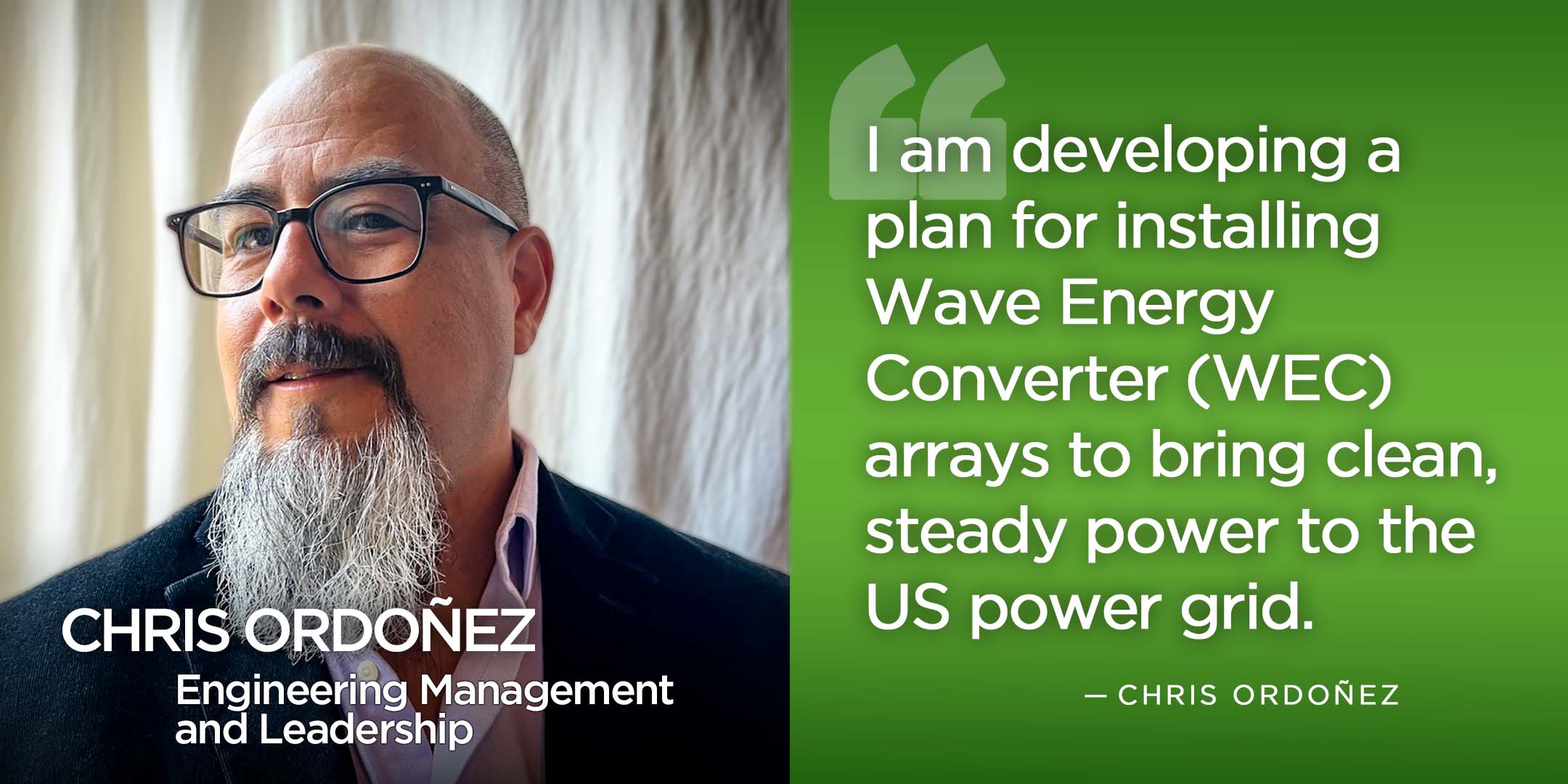-
Meet Chris
-
Graduate program: Masters of Engineering Management and Leadership (MEML)
Year in graduate school: Second
Expected graduation date and degree: December 2024, Masters of Engineering
Hometown: Lubbock, Texas, United States
Connect: Chris on LinkedIn
-
What is the problem your project addresses?
-
The Masters of Engineering Management and Leadership (MEML) program features a Capstone class building on the management and engineering courses we’ve taken. For my Capstone project, I am developing a plan for installing Wave Energy Converter (WEC) arrays to bring clean, steady power to the US power grid. Three pillars support the Energy Transition away from carbon-based fuels: Clean Electricity, Electrification, and Efficiency. WECs would help with the first pillar, providing a steady source of renewable power that is not dependent on time of day or interim winds. While WECs may not currently match the scale or economics of wind and solar, the consistent availability could reduce the need to have carbon-based backup power sources.
- Describe the professional skills and competencies you have developed through your program.
-
I am constantly learning from Rice faculty, Rice development programs, visiting speakers, and my fellow students from across the globe. A few highlights:
I learned how to assess the efficacy of Nature-Based Carbon Sequestration from RSI Director Carrie Masiello. I was also working as a consultant at the time for an ocean-based carbon dioxide removal (CDR) organization and was immediately able to apply my new knowledge.
I developed skills in Data Analysis and Machine Learning using Python in a rigorous data science class. Rice definitely upgraded my coding abilities for Industry 4.0 applications and if nothing else, I have optimism for the problems ML can solve and tremendous empathy for coders I will manage. Professor Edgar Avalos Gauna has developed a crash course I recommend for all technical management students.
I have developed a sense of leadership as a science, learning numerous decision frameworks applicable to people, processes, and technology. Professor Steve Gomez is great at balancing theory and application. I have been managing technical teams for years but now understand how to integrate leadership techniques.
I participated in Doerr Institute Leadership programs, including Activate, to develop an emotionally intelligent approach to technical management. For instance, the training has helped me mindfully approach difficult situations rather than reactively responding to emotional triggers. - Describe any key projects or practical experiences you have been involved in during your program.
-
Working with EDP Renewables as part of Dan Cohan’s Energy and Environment course, our team analyzed the financial feasibility of combining solar power and battery storage. Through this project and other research for the class, we analyzed real-world energy data to draw nuanced conclusions about energy solutions.
I am currently serving as President of the MEML Student Association, where I am working with Rice Faculty and student leaders to identify and implement meaningful improvements for the program and student experience. This role also requires me to serve as a bridge between faculty and students, sharing perspectives and building trust through conversations. All of this helps me to become a more empathetic and consensus-oriented leader.
Rice’s investment in The Ion District has created a gathering place for Houston innovators and technology startups. As a student, I take advantage of my highly discounted membership. At The Ion, I run my consulting business and attend countless seminars and networking events. It has been a boon to my work, my professional connections, and to my perspective as an innovator.
I was honored to serve as moderator for the RCEL Fireside Chat with HPE President and CEO Antonio Neri in front of a large audience. While we spent lots of time preparing with the HPE team before the event, the nature of live interviews requires improvisation and natural conversations in ways slide presentations don’t. It was definitely an opportunity for my professional growth (and fun).
- Are there any upcoming projects or initiatives you are excited about that RSI can highlight?
-
I am especially excited about Rice’s many Energy Transition initiatives and events. Along with other MEML student leaders, I will be participating in the Houston Climate and Energy Startup Week 2024 in September.
- What do you see as the most pressing sustainability challenge?
-
Balancing societal needs within the environmental limits of the planet is the most critical problem. We have not been, and now our ocean-climate system and global biodiversity are facing critical tipping points.
Balance could be achieved through a nexus of science, engineering, and ethics — observing and analyzing the critical metrics of the earth, engineering reasonable solutions, and following ethics that respect humanity and the environment. We are seeing this emerge in international initiatives like the UN Sustainability Goals, national legislation like the IRA, and institutional commitments. But if our urgency lacks prudence and ethical grounding, we risk meeting excess with excess, falling victim to charlatan schemes, facing reactionary resistance, downplaying crises for short-term gains, or excluding large swaths of humanity from their right to development. Solving one problem by creating another is an increasingly losing proposition. This is going to be a long struggle, so we need science-driven technical solutions with broad stakeholder support that will last.
- How do you envision your professional career contributing to solving sustainability challenges?
-
Engineering Management and Energy Transition studies at Rice combined with over two decades in Marine Technology and Ocean Science provide me with the skillset to lead teams developing New Blue Economy technologies. The opportunities in this sector to deliver sustainable solutions are many, from aquaculture to robotic ocean observations. What excites me right now are technologies for wave energy conversion that create renewable, carbon-free electricity. Ocean wave energy is plentiful, consistent, and widely available. The engineering challenges to bring wave-generated power onto the grid are difficult, but achievable, especially with Industry 4.0 approaches like digital twin design, IoT status monitoring, and autonomous behaviors responding to environmental conditions.
- Is there anything else you would like to share about your experience or achievements in the program?
-
Attending Rice is an honor and a privilege. I don’t intend for my involvement with the university to end when I walk across the graduation stage. I look forward to contributing to Rice’s energy transition and sustainability collaboration efforts in Houston and globally.


